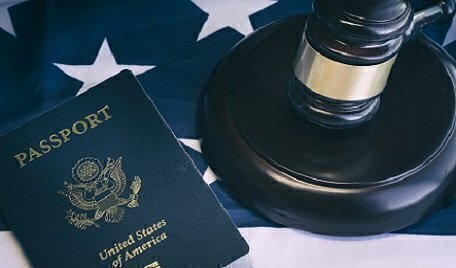The Trump Administration urged the Supreme Court on Tuesday to rule on the constitutionality of the President’s third version of an executive order strictly limiting entry to the U.S. by foreign nationals with Muslim-majority populations. If, as expected, the Court agrees to rule on other legal issues in the case, the question of whether the order also involves a form of unconstitutional religious bias should be added, Administration lawyers told the Court.
 From the beginning of President Trump’s efforts to curb immigration from Mideast nations, the claim of an unconstitutional “Muslim ban” has figured prominently in the courts’ reviews, and several times, lower courts have ruled that these efforts probably do violate the Constitution’s ban on religious discrimination.
From the beginning of President Trump’s efforts to curb immigration from Mideast nations, the claim of an unconstitutional “Muslim ban” has figured prominently in the courts’ reviews, and several times, lower courts have ruled that these efforts probably do violate the Constitution’s ban on religious discrimination.
Although the Supreme Court has been involved in a preliminary way in this controversy, the Justices have never taken a position on the ultimate question of whether it is legal or constitutional.
The Justices currently plan to take their first look at this controversy at their private conference on Friday, when the issue will be whether to grant review of a federal judge’s temporary nationwide order barring enforcement of the entry restrictions. A grant of review probably would be accompanied by an expedited schedule so that the Justices could hear and decide the case before recessing for the summer, probably in late June.
When the Administration filed its appeal early this month, it said the Court did not need to rule on any constitutional questions because, it argued, the President’s authority to impose the limitations on entry was so clear under federal immigration-control laws.
But the state of Hawaii, the lead challenger in the new case before the Court, brought up the religious bias question when it filed its answering brief last week. It contended that the restrictions are, in fact, a “Muslim ban” that violates the First Amendment’s ban on religious discrimination, under the Establishment Clause.
In filing its reply brief Tuesday (the last document to be submitted before the Justices examine the case on Friday), the Administration noted that neither lower court in acting on the Hawaii case had dealt with the claim of religious bias, but added that the Justices should add it to their review.
Hawaii and the other challengers had pursued that claim throughout the case, the government document noted, and they regard it as still a live issue. “Addressing the full range of claims against the [executive order would provide much-needed clarity to the government, [the challengers], and the public,” it said. In addition, it pointed out that a federal judge in Maryland who also had ruled temporarily against the third version of President Trump’s order had found a constitutional violation under the First Amendment. (The Maryland judge’s ruling is now under review in the U.S. Court of Appeals for the Fourth Circuit, which could rule on the case at any time.)
There are at least two reasons why the Justices seem likely to review the Trump order’s validity in the Hawaii case. First, the Justices did allow that order to go fully into effect even as the court challenges to it unfolded. And, second, the Justices had agreed to rule on the legality of the second version of the Trump order, before that order was replaced by the third version now at the Court.
As now enforced, the order applies to eight countries, two of which do not have Muslim majorities. But those two – North Korea and Venezuela – are not covered by the Hawaii challenge; that challenge is aimed only at the order’s application to these six Muslim-majority nations: Chad, Iraq, Libya, Syria, Somalia and Yemen.
The bar to enforcement that the Administration now wants overturned by the Justices would not require the government to allow entry to all foreign nationals from those six countries, but only those foreign nationals from countries who already have a close link to family or an entity in the U.S. But, the government has argued, even limited in that way, the enforcement bar would apply to most of those who seek to enter the U.S. to live or to visit temporarily.
Because the timing for Supreme Court action is short, the Justices may announce as early as Friday afternoon what action they will or won’t be taking on the Hawaii case.
The Administration, meanwhile, will be taking another immigration controversy to the Supreme Court, with a plea for fast action this term: the question of the government’s power to put an end to the five-year-old program, “Deferred Action for Childhood Arrivals,” that now protects nearly 700,000 young immigrants from being deported; they were brought illegally to the U.S. as children by their parents, and thus have no right to remain except under that program.






